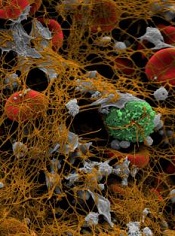
Credit: Andre E.X. Brown
New research suggests dabigatran is noninferior to warfarin as extended prophylaxis for recurrent venous thromboembolism (VTE), and warfarin presents a significantly higher risk of bleeding.
These results are from the RE-MEDY study, which compared the 2 drugs as long-term prophylaxis in patients who had received at least 3 months of VTE treatment.
The data appear in an NEJM article alongside results of the RE-SONATE study, which compared dabigatran and placebo in a similar patient population.
Both of these randomized, double-blind studies were sponsored by the makers of dabigatran, Boehringer Ingelheim.
In the RE-MEDY trial, 2856 patients were randomized in a 1:1 ratio to receive dabigatran or warfarin for up to 36 months. Patients either received active dabigatran at 150 mg twice daily and a warfarin-like placebo or active warfarin and a dabigatran-like placebo. The warfarin dose was adjusted to maintain an INR of 2.0 to 3.0.
In the RE-SONATE trial, 1343 patients were randomized to receive treatment for 6 months. They were assigned in a 1:1 ratio to receive dabigatran at 150 mg twice daily or a matching placebo.
Extended follow-up to evaluate the long-term risk of VTE recurrence took place 12 months after the completion of study treatment.
In RE-MEDY, recurrent VTE occurred in 1.8% of patients in the dabigatran arm and 1.3% of patients in the warfarin arm (P=0.01 for noninferiority).
In RE-SONATE, recurrent VTE occurred in 0.4% of patients in the dabigatran arm and 5.6% of patients in the placebo arm (P<0.001 for superiority).
The rate of clinically relevant or major bleeding was lower with dabigatran than with warfarin—at 5.6% and 10.2%, respectively (P<0.001).
But the rate of clinically relevant or major bleeding was higher with dabigatran than with placebo, at 5.3% and 1.8%, respectively (P=0.001).
“[These results] suggest dabigatran is a good option to prevent deep vein thrombosis and pulmonary embolism from happening again after an initial event,” said lead study author Sam Schulman, MD, PhD, of McMaster University in Hamilton, Ontario, Canada.
“They reinforce the efficacy and favorable safety profile of dabigatran seen in the RE-COVER trials, where dabigatran showed similar efficacy and a significant reduction in clinically relevant bleeding versus warfarin in the treatment of acute venous thromboembolism.”

